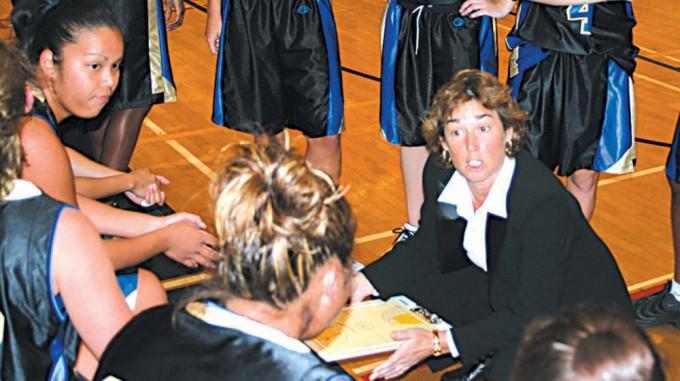Sandra Pothier touched the lives of many before having to step down in 2009 to battle her cancer. Over the weekend she passed away Sports Editor Gabriel Lee reports
Ryerson athletics won’t remember Sandra Pothier for what she accomplished with the women’s basketball team in her remarkable career as the team’s head coach, or for the motivational techniques she used to help her team achieve that success. The legacy that Sandy Pothier left behind here at Ryerson is defined by the way she made people feel over her 18-years of coaching at the university.
After a two-year battle with cancer, the longtime head-basketball coach died on Jan. 21, 2012. She was 50.
The mentor and leader of the women’s basketball team left on medical leave in 2010, handing off the job to her hand picked successor, Charles Kissi. Pothier ended her career at Ryerson with her best-ever regular season finish, as her team boasted an impressive 14-8 record. That year, four of her players were recognized with Ontario University Athletics (OUA) all-star selections — the most of any team in the province.
Pothier was a mentor, a teacher, a visionary and above all a leader.
“It’s still doesn’t feel real,” said Ashley McDonald, a fifth-year guard who played under Pothier for three seasons. “When I was visiting her over the Christmas break at her mom’s house, she related her battle with cancer into basketball terms so I’d be able to understand what she’s going through better.”
When the news of her illness initially broke, letters of supports from former players, friends and colleagues came pouring in; and social media erupted with tributes to her.
Since her passing, her biological family and her basketball family have been hit the hardest.
In class Monday morning, Kelsey Wright found it difficult to focus on much else besides the memories her former coach left her with. Wright changed the background on her phone to a candid photo of Pothier to remind herself of the invaluable lessons she learned from her.
“She was just so intense on the court,” said Wright. “But off the court she was a person who genuinely cared about you.”
Pothier’s entire life revolved around the game of basketball. As a player she played professionally in Europe, winning a Southern Bavarian championship. She coached at every level imaginable, from the Ryerson women’s team to working as an apprentice coach for the Canadian National Team.
“It’s more than what she’s done for Ryerson, even though she put her life into this program” said Charles Kissi. “It’s about what she’s done for basketball in this country.
Due to her unconditional commitment to basketball, she never found time to do much else while she was involved with the game.
So after she took her medical leave in 2010, she took the opportunity to travel more in a year than modt people do in 10, visiting Peru, Mexico, Arizona and the Grand Canyon.
While in Peru with a group of friends she met running a triathlon, she climbed several mountains throughout the country despite her frail state.
This past Christmas, she went tobogganing with her nieces against her brother’s wishes; another testament to the competitive fire that she preached day in and day out.
Wins and losses was never Pothier’s biggest priority. She used basketball to create a culture of “strong independent women” at Ryerson.
Her time at Ryerson was not without controversy however. In 2006, five members of the women’s basketball team quit over alleged racist comments made by Pothier towards black players.
The allegations remain unproven and in 2010 Ryerson recognized her contributions to university life and campus athletics with a $5,000 bursary. The bursary was revealed during a surprise announcement at that year’s Darcel Wright Classic.
Correction: This article previously stated that Pothier went on medical leave in 2009. It has been corrected to 2010.












Leave a Reply